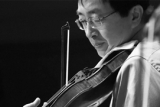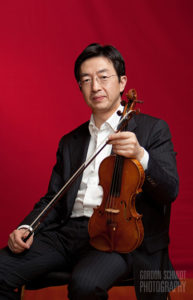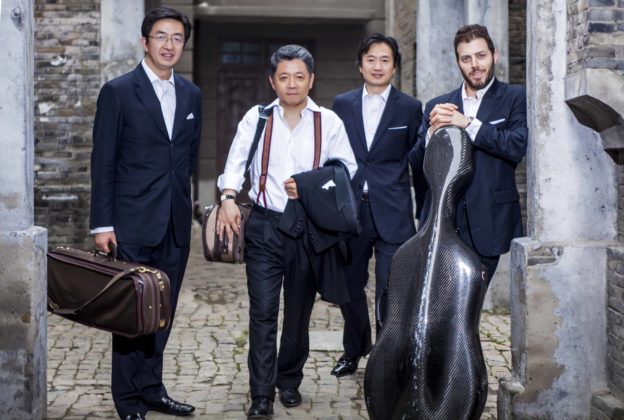As many Chinese and, more generally, Asian violinists, you studied in the United States….
Yes, but I made the major part of my studies in China, if you don’t consider the fact that studying does never stop. I was born into a family of well-known musicians in Shanghai. Both of my parents were professional violinists and my maternal grand-father was also a violinist. He was born in 1908 and was one of the earliest professional classical violinists in China. I began studying the violin with my parents when I was five and went on to attend the Shanghai Conservatory at 14. Three years later, in 1981, when I was seventeen, I was chosen to go to study for one year at the San Francisco Conservatory of Music through a cultural exchange program between the sister cities of Shanghai and San Francisco. In 1985, I graduated from the Shanghai Conservatory and went on studying again – for my finishing touch – in the United States. But by then, we had already created the Quartet.
So, the US were the first address for Chinese students?
In the late eighties and in the nineties, the US ware indeed the first address, far before Europe. The condition was however that you got a good scholarship, since no Chinese family, at that moment, could afford to pay for such studies. Today of course, it is totally different and it’s easier for students who graduated here, to go and get a Western teacher.
Since years, Asian string players seem to dominate the music scene, in the competitions you have a lot of them, in European orchestras you see numerous Asian faces. Is there a reason for that?
Today, China is producing more pianists than violinists. ln the old days, a piano was very expensive to acquire, and to buy a violin was much easier. But there is another reason for the success of the violin in China: Playing the violin when you go to High School gives you a certain credit, because they will want you to join their orchestra, even if it is not a music school. Another reason for music being so much in focus is that with the one-child policy, parents and grandparents will try to do the best for their only descendant, to train him or her for being a well-rounded human being, and music from that point of view, is like a must.
But still there is lack of orchestra musicians here in China?
China establishes one new orchestra every year, and this brings a lot of opportunities for musicians to fix a stable and good career. I think, this trend has started and is not going to stop, but is even going up in the next years. My quartet has traveled, maybe 25 cities in China, some of them being cities which I never would have imagined to go and play a chamber music concert, not to mention a whole Beethoven cycle. But the audience reaction is very surprising, in a very good way.
So, your Quartet was funded when you were still studying?
Yes, and the first years were very much about studying for us. We gathered in fact to participate in a Chinese national chamber music composition, and after winning this competition we were sent to Portsmouth, England, to participate in an international competition. At that moment, nobody of us really thought that we could become a permanent quartet.
What are the best memories from the last 35 years?
Playing our New York debut, over 30 years ago, the first recording, the first concert in Japan, the first Bartok cycle in China, and more recently the Beethoven cycles in China. Playing in Shanghai is very special for us, because we are a home-grown team, even if only two members of the Quartet, my brother an I, are from here. In China we are sometimes considered as a local group, while in America people may ask us: ‘When are you returning to Shanghai?’, and then we say: ‘Well, we live in New York… » It’s confusing for some people.
What are your major plans for the next years?
We will play a lot of Beethoven cycles in China, but also in the United States and in Europe, especially at the Beethoven Festival in Warsaw. I would like to play more in Europe.
When you compare the audiences in Asia, North America and Europe, what is your opinion?
In America, we have a very well-established chamber music audience in many cities. In China, the success is growing. In Shanghai, our concerts are always sold out, Beijing is almost every time sold out, and in other cities we are developing an audience. We want to build knowledgeable audiences for classical music, and we succeed. That was unthinkable even 10 years ago. What is special about these audiences, is the age of the people attending. The majority is very young, a lot are only from 12 to 16 years old. I really believe that the audience for classical music in China, and for chamber music in particular, will continue to tremendously grow in the next years.
What about Chinese music? Have you ever played traditional music?
We were all learning traditional music, pretty much singing, and I always thought I could play traditional string instruments, erhu and pipa, but it is very difficult. I think, it is important that Chinese traditional music is getting better known outside China. Projects like Yo Yo Ma’s Silk Road Ensemble have done a lot, but there is still a way to go and to convince people outside China, how fascinating these instruments are and how beautiful and well developed the music is.
What do you think about including Chinese tunes in western classical music, like some composers do?
I think it is a good thing, if it comes from a genuine inspiration. It has been the case since Puccini and his Madama Butterfly and his Turandot. It can work very well.
Your quartet played in the Stern competition, you having been replaced by a candidate. Was this important for your ensemble?
It is very important for the competition to have this chamber music round. For us it was enriching too. We had interesting ideas which were brought in by the contestants. For me, obviously, it was strange to sit in the Jury and not be part of the ensemble. It was even more astonishing, how flexible my colleagues were when one of the young candidates asked for something very unusual for us. I told myself: ‘Oh, they can do that’. And I am not sure, my colleagues would have agreed if I proposed such a point (laughs).
Do you often work with young quartets?
We do that at the Montclair State University in New Jersey as a quartet, and I personally coach a number of young quartets too.
Chamber music is not as well accepted as orchestral music. What can one do to get it better appreciated?
The greatest part of western classical music is for the string quartet. In some ways this repertoire is even more important than the symphony literature. People tend to come to more chamber music when the reach the age of 40 or 50, when they have heard all these glamorous orchestral pieces or operas and finely want to hear the pure music. Certainly, chamber music is not meant to be played in big halls. It’s not ideal. The scope gets lost. Or you have to play with a bigger sound and then you lose the nuances. Of course, I like to play rather for 1000 people than for 200. Who wouldn’t want that? Yet, it also depends upon the repertoire. You have music fitting better to a bigger hall than other pieces. Beethoven certainly thought very symphonically when he composed his quartets.
Do you make new recordings?
We have ideas, but no very concrete plans. We will do new recordings for sure. Especially because we have now the best possible instruments. I play on a 1714 Antonio Stradivari nicknamed Kneisel Grün, my collegues have Goffriller, Guarneri, and Stradivari instruments, all loaned through the Beare’s International Violin Society, to honor our quartet’s 35th anniversary. Having such instruments makes a huge difference, I can tell you.
What is favorite repertoire?
Beethoven. I will never get tired of it. Other pieces we play for a whole season, we are ready to put them away for five or six years. Beethoven not! And each time we are playing a Beethoven quartet, we discover new aspects.
* The current configuration and for the past 18 years is Weigang Li, violin, Yi-Wen Jiang, violin, Honggang Li, viola, and Nicholas Tzavaras, cello
























